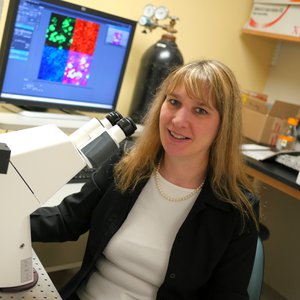Cell Biology, Biochemistry, and Molecular Biology
Cell Biology, Biochemistry, and Molecular Biology is the fundamental study of the underlying molecular processes that drive how organisms live, breathe, and communicate, i.e., how they function. Faculty in this research group are interested in the cellular cycle of life: differentiation, growth, maintenance, and death. Sub-specialties represented within this group include: aging, bioinformatics, biophysics, cell biology, enzymology, metabolic biochemistry, molecular biology, genetics and epigenetics, genomics, lipid biochemistry, microbiology, multi-scale neurobiology, nucleic acid and protein chemistry, pathogenesis and toxicology, reproductive biology, and tumor biology. Studies in some of these areas may lead to a better understanding of the molecular origins of disease, and to development of drugs and other therapies to combat disease.
Members of the Cell Biology, Biochemistry, and Molecular Biology research group study molecular processes in a wide range of organisms (e.g., bacteria, fungi, plants, roundworms, fruit flies, echinoderms, mollusks, fish, mammals, cell lines, and primary cultures). With continuing advancements in single-molecule methods, chemical biology, genome sequencing, and multi-scale approaches in biophysics, our faculty are tackling ever more complex scientific questions.
Our researchers enjoy the use of up-to-date facilities and instrumentation needed for dynamic and collaborative science. These include a confocal light microscope, mass spectrometer, ultracentrifuges, and nuclear magnetic resonance, in addition to greenhouses, a Climate Change Garden and field plots, fresh water and marine aquaria, and small animal vivaria. Cell Biology, Biochemistry, and Molecular Biology group members collaborate extensively with each other, and with others in the departments of Chemistry, Physics, and Biomedical and Chemical Engineering at Syracuse University, as well as with faculty at SUNY Upstate Medical University.
 Yasir Ahmed-Braimah
Associate Professor
yahmed@syr.edu
315.443.1564
Yasir Ahmed-Braimah
Associate Professor
yahmed@syr.edu
315.443.1564
 Carlos A. Castañeda
Associate Professor
cacastan@syr.edu
315.443.3673
Carlos A. Castañeda
Associate Professor
cacastan@syr.edu
315.443.3673
 Heather D. Coleman
Associate Professor
hcoleman@syr.edu
315.443.0453
Heather D. Coleman
Associate Professor
hcoleman@syr.edu
315.443.0453
 Steve Dorus
Professor and Director of Graduate Studies
sdorus@syr.edu
315.443.7091
Steve Dorus
Professor and Director of Graduate Studies
sdorus@syr.edu
315.443.7091
 Scott Erdman
Associate Professor
seerdman@syr.edu
315.443.3748
Scott Erdman
Associate Professor
seerdman@syr.edu
315.443.3748
 Li-En Jao
Associate Professor
ljao01@syr.edu
315.443.2615
Li-En Jao
Associate Professor
ljao01@syr.edu
315.443.2615
 Sarah E. Hall
Associate Professor
shall@syr.edu
315.443.2964
Sarah E. Hall
Associate Professor
shall@syr.edu
315.443.2964
 Heidi Hehnly
Associate Professor
hhehnly@syr.edu
315.443.2159
Heidi Hehnly
Associate Professor
hhehnly@syr.edu
315.443.2159
 Katharine (Kate) Lewis
Professor
kelewi02@syr.edu
315.443.5902
Katharine (Kate) Lewis
Professor
kelewi02@syr.edu
315.443.5902
 Eun-Deok Kim
Assistant Professor
ekim112@syr.edu
315.443.8578
Eun-Deok Kim
Assistant Professor
ekim112@syr.edu
315.443.8578
 James Hewett
Associate Professor
jhewett@syr.edu
315.443.9613
James Hewett
Associate Professor
jhewett@syr.edu
315.443.9613
 Chih Hung Lo
Assistant Professor
clo101@syr.edu
315.443.9657
Chih Hung Lo
Assistant Professor
clo101@syr.edu
315.443.9657
 Jessica MacDonald
Associate Professor, Interim Executive Director of Neuroscience, and Graduate Program Director of the Interdisciplinary Neuroscience Graduate Concentration
jemacdon@syr.edu
315.443.5837
Jessica MacDonald
Associate Professor, Interim Executive Director of Neuroscience, and Graduate Program Director of the Interdisciplinary Neuroscience Graduate Concentration
jemacdon@syr.edu
315.443.5837
 Vera McIlvain
Associate Teaching Professor
vamcilva@syr.edu
315.443.3923
Vera McIlvain
Associate Teaching Professor
vamcilva@syr.edu
315.443.3923
 Heather Meyer
Assistant Professor
hmeyer01@syr.edu
315.443.5816
Heather Meyer
Assistant Professor
hmeyer01@syr.edu
315.443.5816
 Angela M. Oliverio
Assistant Professor
amoliver@syr.edu
Angela M. Oliverio
Assistant Professor
amoliver@syr.edu
 Melissa E. Pepling
Professor and Chair
mepeplin@syr.edu
315.443.4541
Melissa E. Pepling
Professor and Chair
mepeplin@syr.edu
315.443.4541
 Scott Pitnick
Weeden Professor of Biology
sspitnic@syr.edu
315.443.5128
Scott Pitnick
Weeden Professor of Biology
sspitnic@syr.edu
315.443.5128
 Ramesh Raina
Professor and Executive Director of Biotechnology Program
raraina@syr.edu
315.443.4546
Ramesh Raina
Professor and Executive Director of Biotechnology Program
raraina@syr.edu
315.443.4546
 Roy D. Welch
Professor
rowelch@syr.edu
315.443.7197
Roy D. Welch
Professor
rowelch@syr.edu
315.443.7197
 Michele G. Wheatly
Professor of Biology, Former Provost
mwheatly@syr.edu
315.443.6123
Michele G. Wheatly
Professor of Biology, Former Provost
mwheatly@syr.edu
315.443.6123
